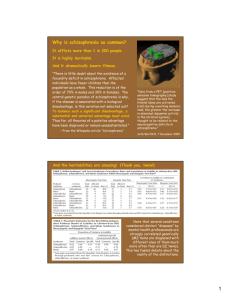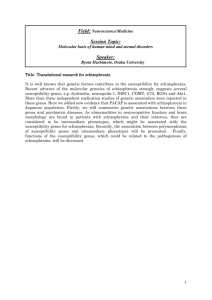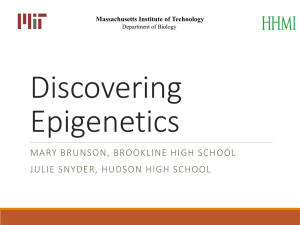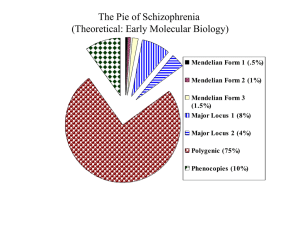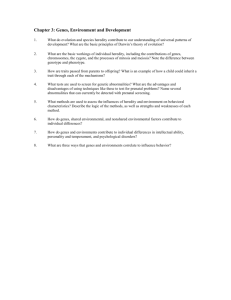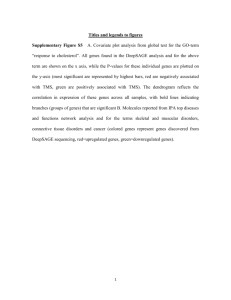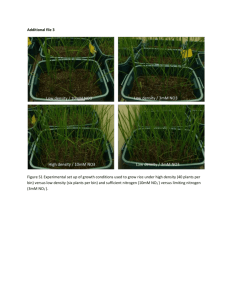twins help find cause of schizophrenia
advertisement
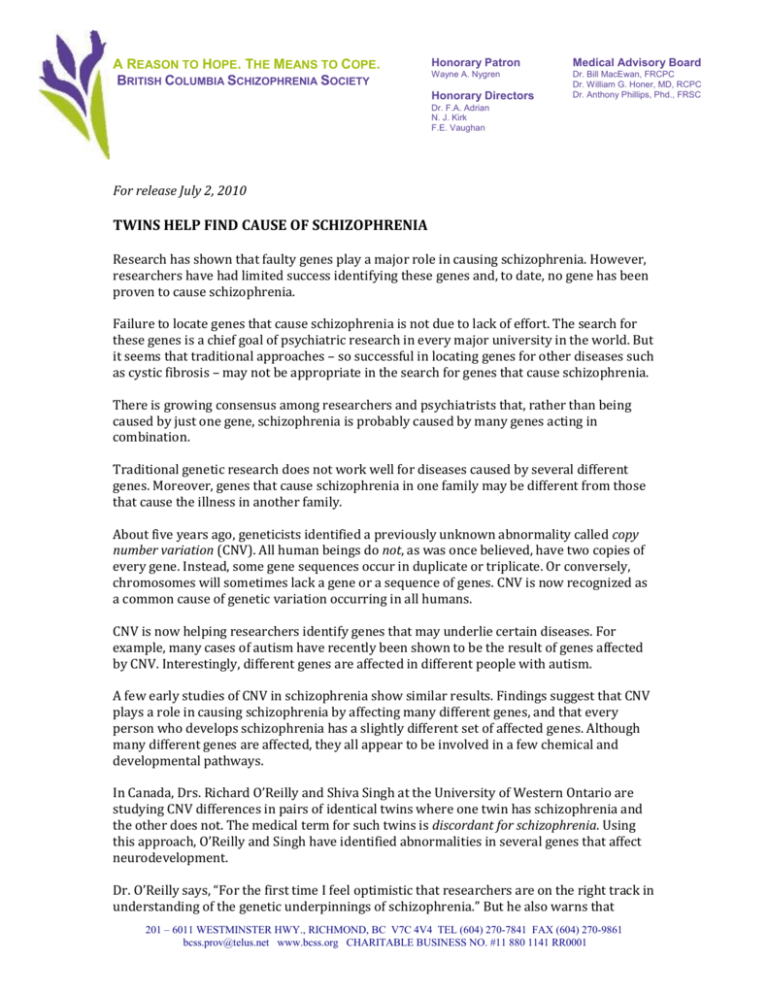
A REASON TO HOPE. THE MEANS TO COPE. BRITISH COLUMBIA SCHIZOPHRENIA SOCIETY Honorary Patron Medical Advisory Board Wayne A. Nygren Dr. Bill MacEwan, FRCPC Dr. William G. Honer, MD, RCPC Dr. Anthony Phillips, Phd., FRSC Honorary Directors Dr. F.A. Adrian N. J. Kirk F.E. Vaughan For release July 2, 2010 TWINS HELP FIND CAUSE OF SCHIZOPHRENIA Research has shown that faulty genes play a major role in causing schizophrenia. However, researchers have had limited success identifying these genes and, to date, no gene has been proven to cause schizophrenia. Failure to locate genes that cause schizophrenia is not due to lack of effort. The search for these genes is a chief goal of psychiatric research in every major university in the world. But it seems that traditional approaches – so successful in locating genes for other diseases such as cystic fibrosis – may not be appropriate in the search for genes that cause schizophrenia. There is growing consensus among researchers and psychiatrists that, rather than being caused by just one gene, schizophrenia is probably caused by many genes acting in combination. Traditional genetic research does not work well for diseases caused by several different genes. Moreover, genes that cause schizophrenia in one family may be different from those that cause the illness in another family. About five years ago, geneticists identified a previously unknown abnormality called copy number variation (CNV). All human beings do not, as was once believed, have two copies of every gene. Instead, some gene sequences occur in duplicate or triplicate. Or conversely, chromosomes will sometimes lack a gene or a sequence of genes. CNV is now recognized as a common cause of genetic variation occurring in all humans. CNV is now helping researchers identify genes that may underlie certain diseases. For example, many cases of autism have recently been shown to be the result of genes affected by CNV. Interestingly, different genes are affected in different people with autism. A few early studies of CNV in schizophrenia show similar results. Findings suggest that CNV plays a role in causing schizophrenia by affecting many different genes, and that every person who develops schizophrenia has a slightly different set of affected genes. Although many different genes are affected, they all appear to be involved in a few chemical and developmental pathways. In Canada, Drs. Richard O’Reilly and Shiva Singh at the University of Western Ontario are studying CNV differences in pairs of identical twins where one twin has schizophrenia and the other does not. The medical term for such twins is discordant for schizophrenia. Using this approach, O’Reilly and Singh have identified abnormalities in several genes that affect neurodevelopment. Dr. O’Reilly says, “For the first time I feel optimistic that researchers are on the right track in understanding of the genetic underpinnings of schizophrenia.” But he also warns that 201 – 6011 WESTMINSTER HWY., RICHMOND, BC V7C 4V4 TEL (604) 270-7841 FAX (604) 270-9861 bcss.prov@telus.net www.bcss.org CHARITABLE BUSINESS NO. #11 880 1141 RR0001 finding all the genes involved is a major undertaking that requires large numbers of twin volunteers. O’Reilly noted how helpful identical twins discordant for schizophrenia are in this effort. Identical twins receive the exact same genes from their parents. Therefore it is easy to identify differences in CNV that have developed in the twins. Such differences have a high possibility of being the reason why one twin got schizophrenia and the other one didn’t. Recruiting twins for this important research is a challenge. Dr. O’Reilly travels throughout Canada to assess suitable twins. He also arranges to fly twins to the University in London, Ontario for assessment. Anyone who can help identify possible twin subjects for this vital research should contact Dr. Richard O’Reilly (519) 455-5110, extension 47240 or email roreilly@uwo.ca - 30 BC Contact Jane Duval, Executive Director BC Schizophrenia Society 604-270-7841 Ext 204 jduval@telus.net 201 – 6011 WESTMINSTER HWY., RICHMOND, BC V7C 4V4 TEL (604) 270-7841 FAX (604) 270-9861 bcss.prov@telus.net www.bcss.org CHARITABLE BUSINESS NO. #11 880 1141 RR0001
